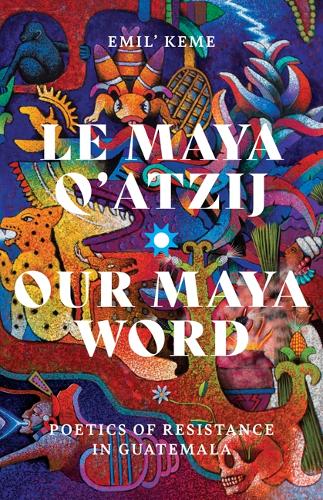
Le Maya Qatzij/Our Maya Word: Poetics of Resistance in Guatemala
(Paperback)
Publishing Details
Le Maya Qatzij/Our Maya Word: Poetics of Resistance in Guatemala
By (Author) Emil Keme
University of Minnesota Press
University of Minnesota Press
17th August 2021
United States
Classifications
General
Non Fiction
Literary studies: poetry and poets
Indigenous peoples / Indigeneity
Politics and government
Colonialism and imperialism
861.64098974207281
Physical Properties
Paperback
264
Width 140mm, Height 216mm, Spine 38mm
Description
Bringing to the fore the voices of Maya authors and what their poetry tells us about resistance, sovereignty, trauma, and regeneration
In 1954, Guatemala suffered a coup detat, resulting in a decades-long civil war. During this period, Indigenous Mayans were subject to displacement, disappearance, and extrajudicial killing. Within the context of the armed conflict and the postwar period in Guatemala, Kiche Maya scholar Emil Keme identifies three historical phases of Indigenous Maya literary insurgency in which Maya authors use poetry to dignify their distinct cultural, political, gender, sexual, and linguistic identities.
Le Maya Qatzij / Our Maya Word employs Indigenous and decolonial theoretical frameworks to critically analyze poetic works written by ten contemporary Maya writers from five different Maya nations in Iximulew/Guatemala. Similar to other Maya authors throughout colonial history, these authors and their poetry criticize, in their own creative ways, the continuing colonial assaults to their existence by the nation-state. Throughout, Keme displays the decolonial potentialities and shortcomings proposed by each Maya writer, establishing a new and productive way of understanding Maya living realities and their emancipatory challenges in Iximulew/Guatemala.
This innovative work shows how Indigenous Maya poetics carries out various processes of decolonization and, especially, how Maya literature offers diverse and heterogeneous perspectives about what it means to be Maya in the contemporary world.
Reviews
"This book offers brilliantly conceptualized and well-grounded readings on the work of Maya poets in times of colonial, patriarchal, and racial violence in Guatemala. Emil Keme's critical journey is permeated by a powerful sense of anti-colonial resistance and an imaginary of Indigenous liberation that is both poetic and political."Luis E. Crcamo-Huechante, founding member of the Comunidad de Historia Mapuche
"With Le Maya Qatzij/Our Maya Word, Emil Keme has given us a brilliant analysis of how Maya literary production constitutes resistance to the ongoing imposition of settler capitalist colonization in Iximulew/Guatemala. From the perspective of a Maya scholar, Keme offers a sophisticated and insightful read of works by Kiche, Kaqchikel, Qeqchi, Qanjobal, and Popti poets in their political context, guided throughout by a clear and decisive love of le Maya tzij, or the Maya word. This book makes a valuable contribution not only to Maya studies and literary studies, but also to Native and Indigenous studies hemispherically and globally."Shannon Speed (Chickasaw), University of California, Los Angeles
"Le Maya Qatzij / Our Maya Word is an energetic attempt to recover and promote Mayan identity, culture, and language from over five hundred years of encroachment. The author critically analyzes poetry that delves into the challenges of the Mayan people in the land claimed as Mayan: Iximulew "Studies in 20th & 21st Century Literature
"It is clear both from the studied works and from Keme's analysis that contemporary Mayan literature has a complexity that seems not only to evolve but is constantly differentiating and diversifying itself."The Canadian Journal of Native Studies
Author Bio
Emil Keme (a.k.a., Emilio del Valle Escalante) is an Indigenous Kiche Maya scholar and associate professor of Spanish at the University of North Carolina, Chapel Hill. He is author of Maya Nationalisms and Postcolonial Challenges in Guatemala. In 2020, he was awarded Cubas Casa de las Amricas literary criticism prize for the Spanish version of Le Maya Qatzij / Our Maya Word.
